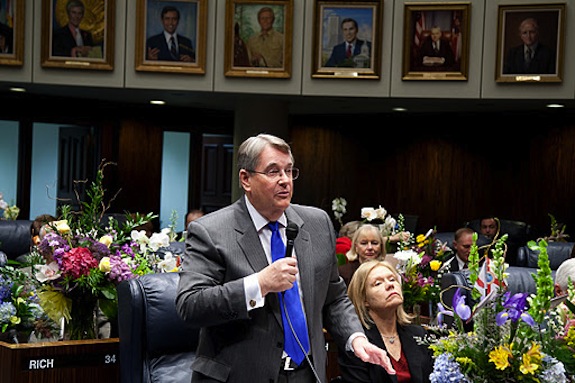
Florida Senate President Don Gaetz said ethics reform is a priority for the Florida Legislature this year. (Photo courtesy of Florida Senate.)
By Ashley Lopez
Florida Center for Investigative Reporting
On Tuesday, an ethics bill aimed at addressing Tallahassee’s “revolving door”– the movement of government employees from lobbying firms to the positions they lobbied — cleared a Senate panel.
It was announced by leaders in the Florida Legislature that ethics reform would be a legislative priority for the upcoming session, which starts this March. Florida Senate President Don Gaetz, R-Niceville, has already appointed Sen. Jack Latvala to spearhead the project, and a bill is making its way through committees. Florida House Speaker Will Weatherford, R-Wesley Chapel, has said that he is looking at recommendations from a watchdog group in Tallahassee.
So far, Senate leaders have moved forward on the promise. However, no bill has been introduced in the Florida House, but Senate leaders have said they will finalize a bill and hand it to House members for their consideration.
According to The Tampa Bay Times, these are some of the things the ethics bill does:
- Extends a ban that currently prohibits lawmakers from lobbying their colleagues in the legislative branch for two years after leaving office to include the executive branch (the governor’s office and state agencies).
- Prohibits lawmakers and all elected officials in Florida (yes you school board members, county commissioners and city council members) from accepting a state administrative job after getting elected.
- Requires lawmakers to abstain from voting on issues that benefit them or family members.
- Prohibits lawmakers from using political committees for personal expenses.
The bill, which the Times reports is being touted as “the most far-reaching ethics reform in 36 years,” received bipartisan support in the Senate panel.
It even received votes from lawmakers who would be affected by a ban on lobbying as a state lawmaker. For example, state Sen. John Thrasher, R-St. Augustine, has lobbied the governor’s office in the past, while also working as a state lawmakers. He voted for the bill, even though he would no longer be able to do that, if the bill passes.
There is a long history of state lawmakers lobbying lawmakers outside of the Legislature, while they themselves were lawmakers.
The Miami Herald’s Marc Caputo reported in 2010 that U.S. Sen. Marco Rubio was among those lawmakers. At the time he was lobbying local level officials, Rubio had already secured his spot as Florida House Speaker and was running for the U.S. Senate seat he would eventually win.
Rubio never talked about his lobbying and that’s because, his campaign said, he wasn’t really a lobbyist. He was a lawyer representing clients.
“The reason Marco Rubio never spoke about his ‘lobbying’ is because he was never a ‘lobbyist,’ in the Tallahassee-influence-peddling sense of the word that Charlie Crist is all too familiar with,” said campaign spokesman Alex Burgos…
Still, it’s called a lobbyist registration by Miami-Dade. So the ‘L’ word is tough to avoid, though early stories on him running for the Legislature in 1999 merely identified as commissioner and a lawyer.
PolitiFact explained that “his work was not what we traditionally think of as lobbying — the Gucci-wearing attorney who seeks to influence the state Legislature or Congress. [Rubio] worked at the local level, primarily on zoning matters.”
Either way, Rubio was a lobbyist in some form while he was a sitting lawmaker.
This very loophole — one that allows elected officials to work for lobbying firms — is one of the noted corruption liabilities for the state pointed out in the latest report from Integrity Florida. Integrity Florida is a nonpartisan group that investagates public corruption in Florida. The organization’s latest research also shows that in the past decade there were 781 federal convictions on corruption charges in the state.
Integrity Florida testified during Tuesday’s meeting and has been one of the groups working closest with lawmakers to create ethics reform in Tallahassee.
